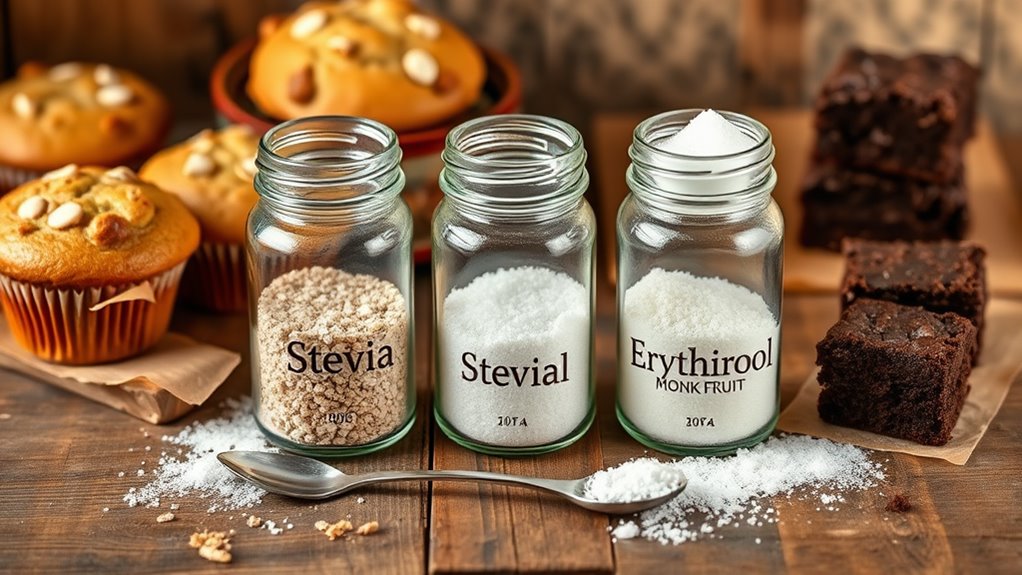When you're baking guilt-free, consider natural sweeteners like honey and maple syrup for their rich flavors and health benefits. For a low-calorie option, try stevia or erythritol, which won't spike your blood sugar. Coconut sugar and agave nectar offer a delicious taste with a lower glycemic index. If you desire a unique twist, date sugar adds fiber, while applesauce lends moisture to your treats. Each substitute requires a bit of adjustment in recipes, but the results are worth it. Explore these choices further, and you'll find the perfect match for your guilt-free baking adventures.
Key Takeaways
- Stevia is a zero-calorie sweetener, significantly sweeter than sugar, making it perfect for guilt-free baking with minimal impact on blood sugar levels.
- Erythritol is a low-calorie sugar alcohol that offers about 70% of sugar's sweetness, ideal for keto-friendly recipes without guilt.
- Agave Nectar provides a mild, caramel-like taste and can be easily substituted for sugar at a 1:1 ratio, supporting healthier choices.
- Coconut Sugar retains nutrients and has a lower glycemic index, giving baked goods a caramel-like flavor while being healthier.
- Applesauce adds natural sweetness and moisture, enhancing the texture of baked goods while reducing overall sugar content.
Honey
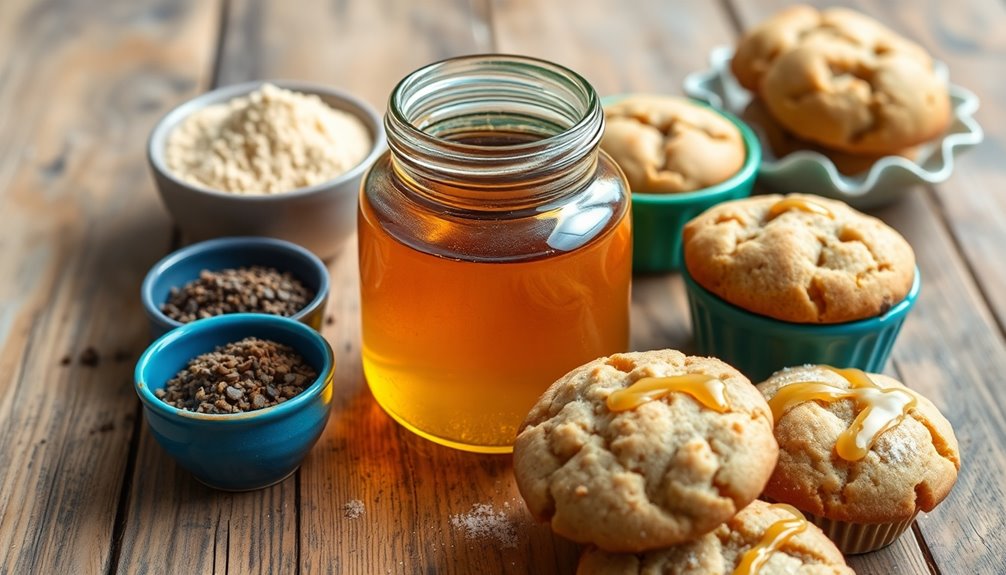
Honey, often praised as nature's sweetener, is a popular choice for those looking to reduce refined sugars in their baking. By using honey, you're not only adding sweetness, but you're also incorporating a variety of health benefits. Rich in antioxidants, honey can help combat oxidative stress in your body. It's also known for its antibacterial properties, making it a wholesome alternative to traditional sugars.
When you bake with honey, you're introducing unique flavor profiles that can enhance your creations. Depending on the type you select, such as clover, wildflower, or buckwheat, you can achieve different undertones. For example, clover honey offers a light, mild sweetness, while buckwheat honey provides a strong, earthy flavor. This versatility allows you to experiment, adding depth to your recipes.
However, it's important to remember that honey is sweeter than sugar, so you'll want to adjust your measurements accordingly. A general rule of thumb is to use about ¾ cup of honey for every cup of sugar and reduce the liquid in your recipe by about ¼ cup. This guarantees your baked goods maintain the right consistency.
When embracing honey in your baking, you're not just enhancing the taste; you're also connecting with natural ingredients that promote health and well-being. A plant-based diet encourages the use of whole, unprocessed foods like honey, which can further enhance your baking experience. So go ahead, let honey sweeten your kitchen adventures while benefiting your body and satisfying your taste buds. Enjoy the journey of guilt-free baking!
Maple Syrup
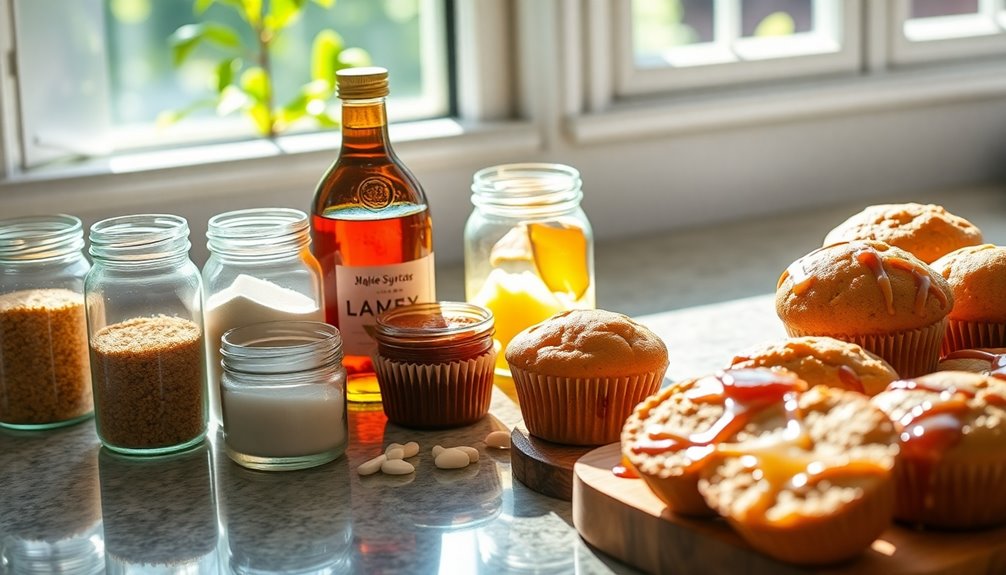
When it comes to sweetening your baked goods, maple syrup stands out as a delicious and nutritious alternative. Not only does it add a unique flavor, but it also offers several maple syrup benefits that make it an excellent choice for guilt-free baking.
Here are three key reasons to incorporate maple syrup into your recipes:
- Nutrient-Rich: Maple syrup contains essential minerals like manganese and zinc, which can support your immune system and overall health.
- Lower Glycemic Index: Compared to refined sugar, maple syrup has a lower glycemic index, meaning it can lead to less drastic spikes in blood sugar levels.
- Versatile in Recipes: You can easily substitute maple syrup for sugar in many recipes, making it a convenient option for your baking needs.
Additionally, using natural sweeteners like maple syrup can complement whole food sources of protein in your diet, enhancing both flavor and nutritional value. If you're looking for inspiration, there are countless maple syrup recipes out there. From fluffy pancakes to rich brownies, you can enhance the flavor and nutrition of your favorite dishes. Just remember, when substituting, use about three-quarters of a cup of maple syrup for every cup of sugar, and reduce the liquid in your recipe slightly to maintain the right consistency.
Stevia
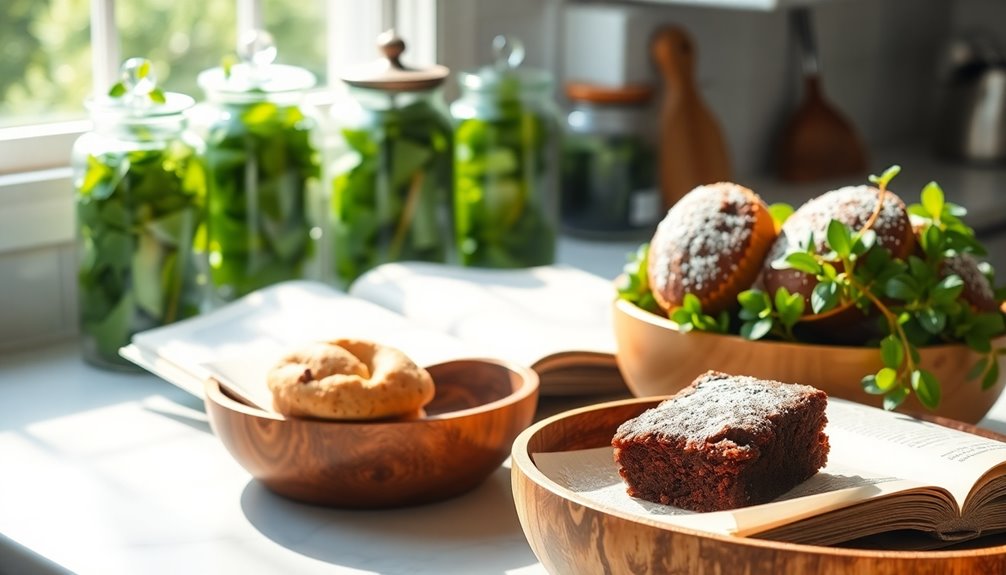
Stevia is a natural sweetener derived from the leaves of the Stevia rebaudiana plant, making it a popular choice for those seeking a sugar alternative without the added calories. This sweetener is known for its intense sweetness, often being several hundred times sweeter than sugar, which means you'll need just a small amount to achieve the desired flavor in your recipes.
One of the key Stevia benefits is its low glycemic index, which makes it suitable for people managing blood sugar levels or those following a low-carb diet. Additionally, Stevia contains no calories, allowing you to indulge in your favorite baked goods without the guilt. As you explore Stevia recipes, you'll find it works well in various dishes, from cookies and cakes to beverages and sauces, enabling you to maintain sweet flavors without compromising your health goals.
When using Stevia, remember that it may behave differently than sugar in recipes. Sometimes, you might need to adjust the liquid or other ingredients to achieve the right texture. Many bakers find success by combining Stevia with other sugar substitutes to balance sweetness and texture, creating a delightful experience for everyone. Furthermore, opting for Stevia can help you avoid the negative health impacts associated with high glycemic index traditional sweeteners.
As you embrace Stevia in your baking, you'll discover not just a healthier alternative, but also a way to share delicious treats with friends and family. So, why not give Stevia a try and enjoy guilt-free baking while reaping its numerous benefits?
Erythritol
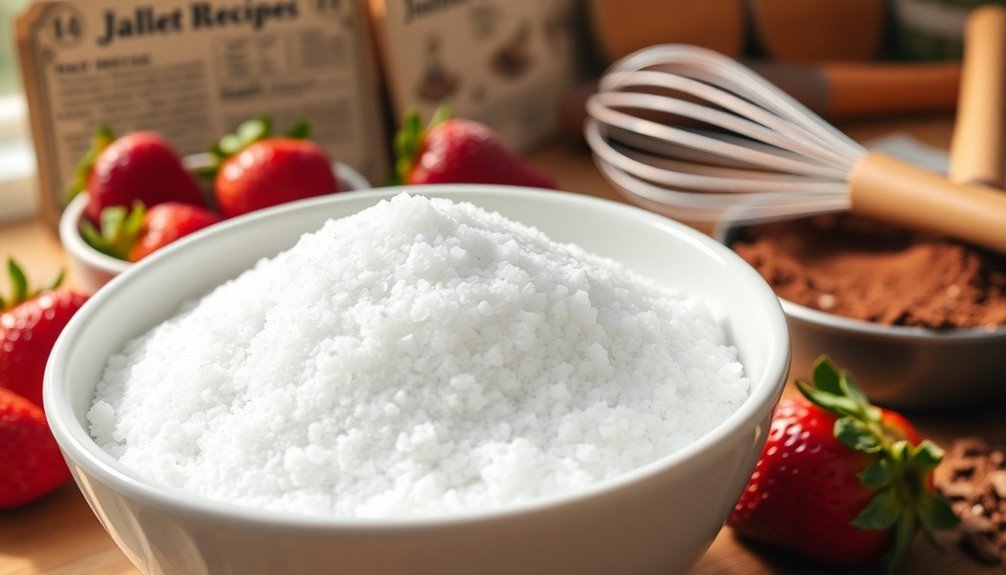
Erythritol, a popular sugar alcohol, offers a low-calorie alternative for those looking to sweeten their baked goods without the extra calories. If you've got a sweet tooth but want to maintain a healthier lifestyle or follow a keto diet, erythritol might be your new best friend.
Here are three key benefits of using erythritol in your baking:
- Low-Calorie Sweetness: Erythritol has about 0.24 calories per gram, making it an excellent choice for guilt-free baking. You can enjoy sweet treats without worrying about calorie overload.
- Keto Friendly: Since erythritol has a minimal impact on blood sugar levels, it's perfect for keto friendly baking. You can whip up delicious desserts that align with your dietary goals, ensuring that you feel satisfied without derailing your progress.
- Sweet Tooth Satisfaction: Erythritol provides about 70% of the sweetness of sugar, which means your baked goodies will still taste delightful. You won't have to sacrifice flavor for health, allowing you to enjoy treats that everyone can love.
However, moderation is key. Some people might experience digestive issues with sugar alcohols, so it's best to start small. Erythritol allows you to indulge your cravings while keeping your baking healthy and enjoyable. With its unique properties, it's a wonderful addition to your pantry for those moments when you want to create something sweet and satisfying without the guilt. Additionally, you can find custom keto diet plans to help guide your overall nutrition while enjoying treats like these.
Coconut Sugar
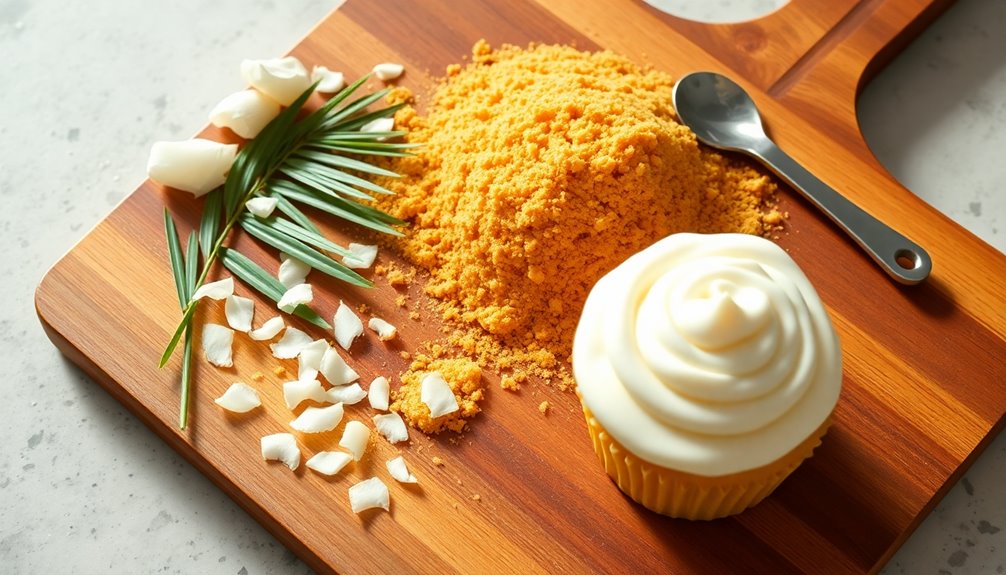
Coconut sugar has gained popularity as a natural sweetener among health-conscious bakers looking for alternatives to refined sugars. Made from the sap of coconut palm trees, it retains some nutrients, making it a more wholesome choice. When you're baking with coconut sugar, you might notice its caramel-like flavor, which can enhance your recipes beautifully. For best results, remember that coconut sugar is less sweet than regular sugar, so you may need to adjust the quantities accordingly.
One of the key health benefits of coconut sugar in baking is its lower glycemic index, which means it can lead to a slower rise in blood sugar levels. This makes it a better option for those seeking to manage their blood sugar or reduce their overall sugar intake. Additionally, coconut sugar contains small amounts of vitamins and minerals like potassium and magnesium, contributing to a more nutritious profile.
When it comes to baking with coconut sugar, here are a few tips and tricks:
- First, consider dissolving it in warm liquids to help it blend more easily into your batter.
- Second, because it can add moisture, you might want to reduce other liquid ingredients slightly.
- Finally, keep an eye on baking times, as coconut sugar can cause baked goods to brown faster than traditional sugars.
Incorporating coconut sugar into your baking aligns with age-old health practices that emphasize natural, less restrictive diets.
Agave Nectar
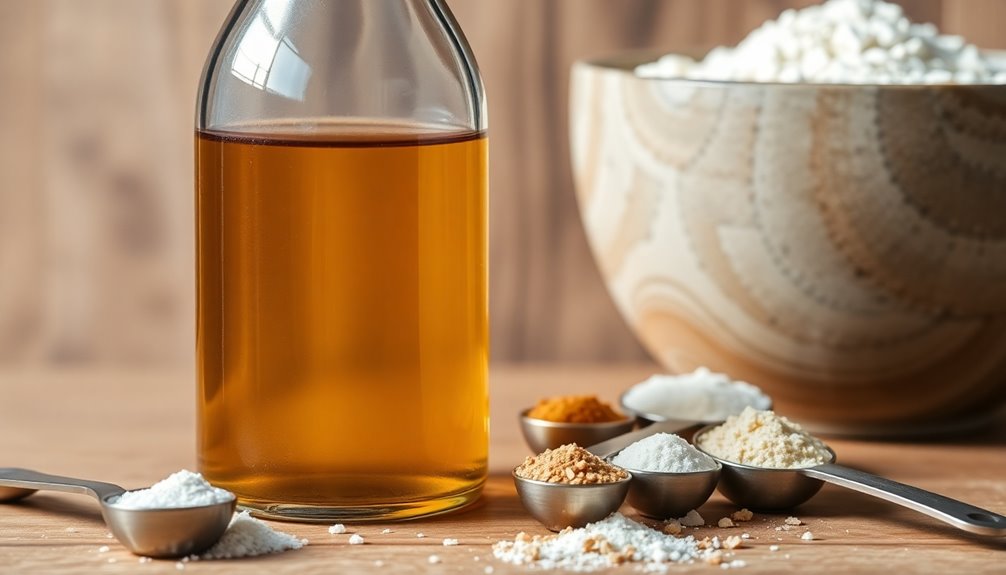
Agave nectar is a popular liquid sweetener that many bakers turn to for its unique flavor and lower glycemic index. This natural sweetener, derived from the agave plant, offers several advantages that can enhance your baking experience. If you're looking to reduce sugar intake without sacrificing taste, agave nectar might just be your perfect companion.
Here are some notable agave nectar benefits:
- Lower Glycemic Index: Agave nectar has a glycemic index of around 15, compared to table sugar's 65. This means it has a lesser impact on blood sugar levels, making it a better choice for those monitoring their glucose.
- Versatile Flavor: With a mild, caramel-like taste, it complements a variety of baked goods, from cookies to cakes. You can easily incorporate it into your favorite agave nectar recipes without overwhelming the other flavors.
- Easier to Measure: As a liquid sweetener, agave nectar blends seamlessly in batters and doughs. You can substitute it for sugar in a 1:1 ratio, making it a straightforward swap in your recipes.
When experimenting with agave nectar, remember that a little goes a long way. It's a fantastic option for guilt-free baking, allowing you to satisfy your sweet tooth while being mindful of your health. Additionally, opting for natural sweeteners like agave nectar can contribute to promoting rapid and healthy fat loss, aligning with healthier dietary choices.
Monk Fruit
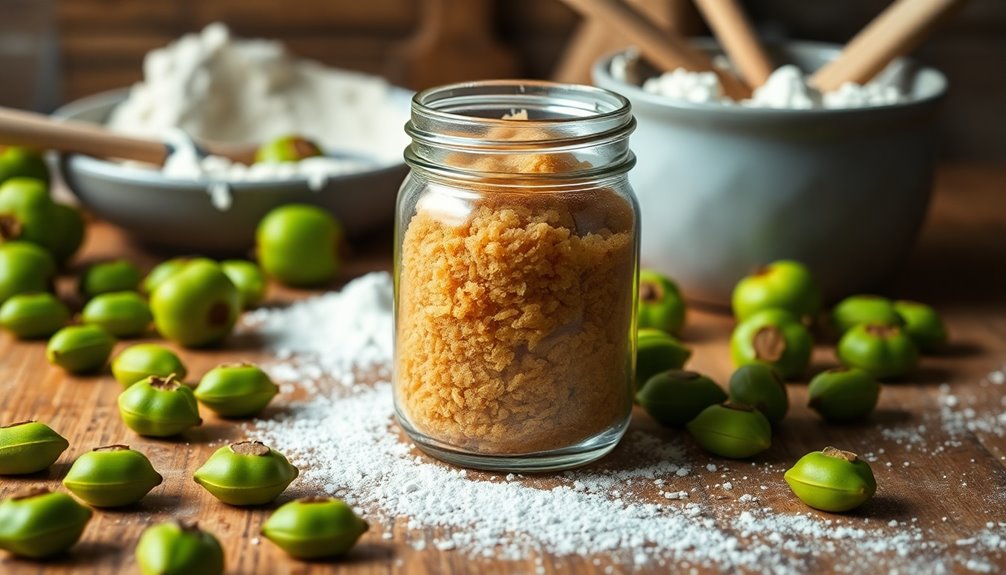
When you're looking for a natural sweetener that won't spike your blood sugar, monk fruit is an excellent choice. Derived from the monk fruit plant, this sweetener contains mogrosides, which are compounds that give it its sweetness without the calories or carbs. One of the standout monk fruit benefits is its ability to provide a sweet taste without affecting your insulin levels, making it ideal for those managing diabetes or anyone seeking a healthier lifestyle.
You'll find monk fruit sweetener versatile in your kitchen. Whether you're baking cookies, muffins, or even cakes, it can replace sugar in most recipes at a 1:1 ratio, though you may want to experiment a bit. Since it's much sweeter than sugar, you might start with less and adjust based on your preference. Try using monk fruit in your favorite recipes like chocolate chip cookies or blueberry muffins for a guilt-free treat that still satisfies your sweet tooth.
Incorporating monk fruit into your baking not only enhances flavor but also brings a sense of belonging to a community that values health-conscious choices. As you share your monk fruit recipes with friends and family, you'll inspire others to explore healthier options without sacrificing taste. Additionally, research from the Emory University School of Medicine supports the effectiveness of natural sweeteners like monk fruit in managing diabetes. So, next time you're whipping up something sweet, consider monk fruit as your go-to alternative for a delightful, sugar-free experience.
Date Sugar

Another natural sweetener you might consider for your baking is date sugar, which offers a unique flavor profile and nutritional benefits. Made from ground, dehydrated dates, it retains much of the fruit's natural fiber, vitamins, and minerals. This makes it a standout choice for those looking to add a nutritious twist to their recipes.
When you're baking with date sugar, here are a few tips and tricks to keep in mind:
- Adjust Liquid Ingredients: Since date sugar absorbs moisture, you may need to increase the liquid in your recipes to maintain the right texture.
- Experiment with Ratios: Date sugar is less sweet than regular sugar, so you might want to use about 1.5 times the amount to achieve the desired sweetness.
- Pair with Other Flavors: Date sugar's rich caramel-like flavor works wonderfully with spices like cinnamon or nutmeg, enhancing your baked goods.
The health benefits of date sugar in baking are notable. It's packed with fiber, which aids digestion, and it contains antioxidants that can help combat inflammation. Plus, its lower glycemic index can make it a better choice for blood sugar control compared to refined sugars. By incorporating date sugar into your baking, you not only enjoy delicious treats but also promote a healthier lifestyle. Additionally, using natural sweeteners like date sugar can align well with a Keto diet journey, making your baked goods both satisfying and guilt-free. So why not give it a try and elevate your next baking adventure?
Applesauce
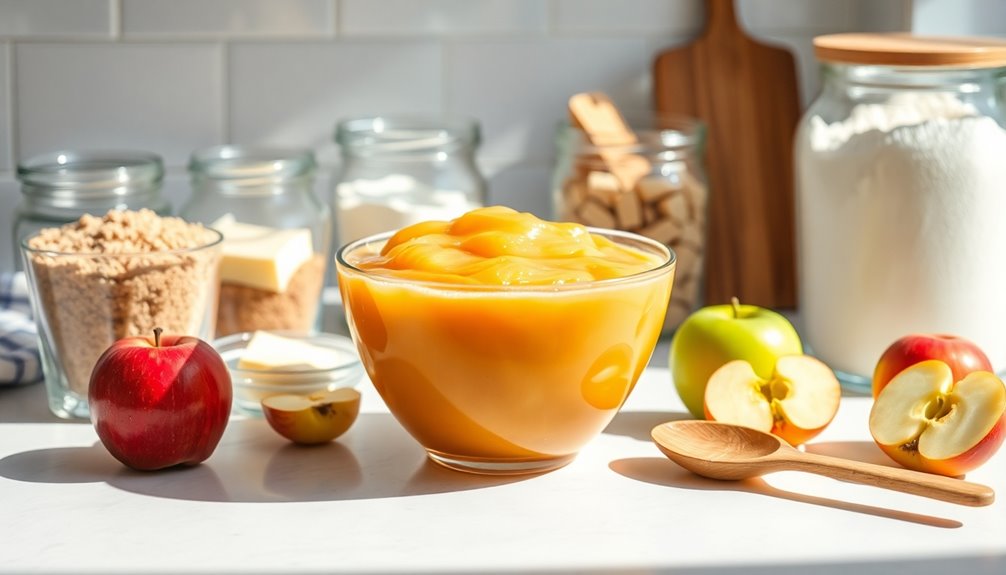
Applesauce serves as a versatile and healthier sugar substitute in baking, bringing moisture and natural sweetness to your recipes. This flavorful alternative isn't just about taste; it's also an excellent way to enhance the texture of your baked goods. When you replace sugar with applesauce, you can reduce the overall calories without sacrificing the delightful flavor you love.
One of the standout benefits of using applesauce is its moisture retention properties. This means your cakes, muffins, and breads will stay tender and fresh longer, which is especially helpful if you're baking in bulk or planning for future snacks. The natural sugars in applesauce help balance out the sweetness, making it an ideal option for those who want a less sugary treat.
When substituting applesauce for sugar, a common ratio is to use one cup of applesauce for every cup of sugar removed, but you might want to adjust according to your taste preferences. Keep in mind that reducing other liquids in the recipe may be necessary, as applesauce already adds moisture.
Incorporating applesauce into your baking not only aligns with a healthier approach but also connects you with a community that values wholesome ingredients. So, whether you're whipping up a batch of brownies or a loaf of banana bread, consider applesauce as your go-to sugar substitute. It's a simple way to create delicious, guilt-free treats that everyone can enjoy.
Frequently Asked Questions
Can I Mix Sugar Substitutes in My Recipes?
Yes, you can mix sugar substitutes in your recipes! Mixing substitutes allows for unique flavor combinations that can enhance your baking. When you experiment with different sweeteners, it's a good idea to conduct taste testing to find the perfect balance.
Just remember that each substitute has its own sweetness level and characteristics, so adjust accordingly. Enjoy the process of baking experiments, and don't hesitate to share your delicious creations with others!
How Do Sugar Substitutes Affect Baking Time?
Sugar substitutes can alter your baking time noticeably. They often retain moisture differently, impacting the baking texture of your treats. If you're using a liquid sweetener, you might need to adjust the overall liquid in your recipe, while granulated substitutes could necessitate a longer baking time.
Balancing flavor is also important; some substitutes may taste sweeter, so you might want to reduce the amount to maintain that ideal flavor balance you're aiming for.
Are Sugar Substitutes Safe for Children?
When it comes to sugar substitutes for kids, think of them as a rainbow—vibrant and varied, but not all colors are created equal.
Most sugar substitutes are generally safe, yet it's crucial to take into account health implications. Some children might've taste preferences that lean toward natural sweetness, making certain substitutes more appealing.
Moderation is key, and consulting with a healthcare provider can help guarantee you're making the best choices for your child's health.
Which Sugar Substitute Has the Least Calories?
When you're looking for a sugar substitute with the least calories, stevia often comes out on top in sugar substitute comparisons. It's a natural sweetener that's calorie-free, making it a popular choice for those watching their intake.
Baking with stevia can be a bit different, as it's much sweeter than sugar, so you'll need to adjust your measurements. Experimenting with it can lead to delicious, guilt-free treats everyone can enjoy!
Do Sugar Substitutes Have Any Aftertaste?
You might've noticed that some sugar substitutes can leave a strange aftertaste. This often ties back to flavor perception, which varies from person to person.
While some substitutes enhance your baking results, others can be hit or miss. For example, stevia might taste bitter to some, while erythritol is smoother.
If you're experimenting, it's worth trying different options to see what fits your palate best, ensuring everyone feels included in your delicious creations.
Conclusion
So, it turns out you can satisfy your sweet tooth without the guilt—who knew? With options like honey, stevia, and monk fruit, you can whip up delicious treats that won't sabotage your health goals. Ironically, as you swap out refined sugar for these alternatives, you might find yourself enjoying your desserts even more. Embrace the sweetness of these substitutes, and bake away, knowing you're making smarter choices without sacrificing flavor. Your taste buds—and waistline—will thank you!

